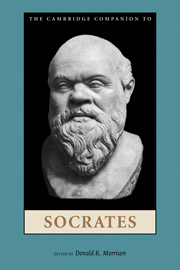Book contents
- Frontmatter
- 1 The Rise and Fall of the Socratic Problem
- 2 The Students of Socrates
- 3 Xenophon and the Enviable Life of Socrates
- 4 Socrates in Aristophanes’ Clouds
- 5 Socrates and the New Learning
- 6 Socratic Religion
- 7 Socrates and Democratic Athens
- 8 Socratic Method
- 9 Self-Examination
- 10 Socratic Ignorance
- 11 Reconsidering Socratic Irony
- 12 Socratic Ethics and the Socratic Psychology of Action
- 13 Socrates and Eudaimonia
- 14 Socrates’ Political Philosophy
- 15 Socrates in Later Greek Philosophy
- Socrates Bibliography
- Index of Names and Subjects
- Index of Passages
5 - Socrates and the New Learning
Published online by Cambridge University Press: 28 March 2011
- Frontmatter
- 1 The Rise and Fall of the Socratic Problem
- 2 The Students of Socrates
- 3 Xenophon and the Enviable Life of Socrates
- 4 Socrates in Aristophanes’ Clouds
- 5 Socrates and the New Learning
- 6 Socratic Religion
- 7 Socrates and Democratic Athens
- 8 Socratic Method
- 9 Self-Examination
- 10 Socratic Ignorance
- 11 Reconsidering Socratic Irony
- 12 Socratic Ethics and the Socratic Psychology of Action
- 13 Socrates and Eudaimonia
- 14 Socrates’ Political Philosophy
- 15 Socrates in Later Greek Philosophy
- Socrates Bibliography
- Index of Names and Subjects
- Index of Passages
Summary
Socrates’ life coincides with a period in which various intellectual movements seemed, to conservatives, to mount a concerted attack on traditional values. These movements I will gather under one name, “the new learning,” without meaning to imply that any one person subscribed to all of them. The two elements in the new learning that seem to have troubled traditionalists the most were natural science and forensic argument. Socrates was associated in the public eye with the new learning; this association is one of the few things we know about him with historical certainty. Probably he was part of the movement in his own unique way, although he had little to do with science and was opposed to the teaching of public speaking.
science and argument
The natural science of the day differed from modern science in many ways, but it has this similarity: it sought to displace traditional supernatural explanations with natural ones, and in so doing it encountered resistance (though not so fierce as the modern American resistance to the teaching of evolution). Early cosmologists proposed accounts of the beginnings of things in terms of familiar natural processes, while early anthropologists explained culture as produced by human invention, and one historian explained human events in terms of an empirical theory of human nature. Taken together, these theories leave no room for traditional explanations that appeal to action by the gods. The new learning offered the ancient Greeks cosmology without creation, human progress without divine teaching, and human history without divine intervention.
- Type
- Chapter
- Information
- The Cambridge Companion to Socrates , pp. 91 - 110Publisher: Cambridge University PressPrint publication year: 2010
- 1
- Cited by



